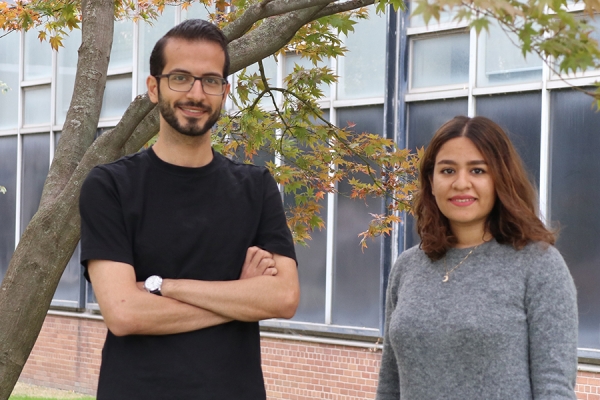 Doctoral student Soroush Ziaeinejad and master’s candidate Farinam Hemmati Zadeh are part of a team working with computer science professor Hossein Fani to use online reviews in customer feedback analytics.
Doctoral student Soroush Ziaeinejad and master’s candidate Farinam Hemmati Zadeh are part of a team working with computer science professor Hossein Fani to use online reviews in customer feedback analytics.
Don’t think those reviews you post on social media go unnoticed. A team of UWindsor researchers are mining for the very words you write online about a great restaurant meal or faulty cell phone.
Computer science researchers are combing the internet looking for unsolicited reviews — the reviews people write on Twitter and Facebook without being asked to write them by the restaurant, service provider, product, or store.
The project, “Customer Feedback Analytics from Unsolicited Resources,” is funded by a three-year $270,000 NSERC Alliance-Mitacs Accelerate grant in partnership with Press’nXPress, a software company specializing in customer feedback management systems.
“Through this project we aim to enhance customer satisfaction by automatically understanding the dynamics of the social feedback and how that reflects on specific customer's needs and preferences,” says Hossein Fani, computer science professor and lead investigator on the project.
“Secondly we aim to increase customer retention, enhance business opportunities, and identify emergent community trends.”
Farinam Hemmati Zadeh, a master’s student on the project, says she is excited by it potential to improve customer care.
“I have a lot of passion for this project from the technical side, because this is my work experience, but also because I know how it can help the businesses and help the customers to be happy, so in the future it will get back to me and I’ll get better services and products,” says Hemmati Zadeh.
Dr. Fani says Press’nXPress is the world’s first and only Canadian company that will connect social channels with physical touchpoints.
Doctoral student Soroush Ziaeinejad says the industry partnership is an important aspect of the research.
“This in part is called information retrieval systems, which is extracting information from existing information on the web that people may not understand by just seeing that information; I like doing this,” he says.
Existing Customer Feedback Management (CFM) systems rely on solicited feedback, such as client satisfaction surveys, Fani says, failing to take into account online social platforms where the customers are not constrained and can leave unsolicited feedback publicly.
His team seeks to be among the first to leverage these unsolicited public feedback outlets using social network analysis and natural language processing techniques.
“The foremost outcome will be the next-generation social-aware CFM that will be adopted by the growing social feedback, and therefore, enhance Canada’s position as one of the world leaders in CFM solutions,” he says.
—Sara Elliott
